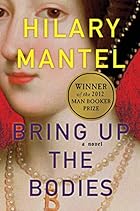 "Divorced, beheaded, died, divorced, beheaded, survived."
"Divorced, beheaded, died, divorced, beheaded, survived."That's how school children remember the fate of King Henry VIII's six wives between 1509 and 1547. Bring up the Bodies is set in 1535-36, when Henry is married to his second wife, Anne Boleyn. Thomas Cromwell has risen from humble birth to a place as the King's Master Secretary. He engineered Henry's divorce from Catherine of Aragon, and his marriage to Anne Boleyn. But Anne has been unable to deliver Henry a son and heir, and Henry turns on Anne:
Henry beckons her to approach. Beckons her till her face is close to his own. His voice low and vehement: 'Why not geld me while you are at it? That would suit you, would it not, madam?' Faces open in shock. The Boleyns have the sense to draw Anne backwards, backwards and away, Mistress Shelton and Jane Rochford flapping and tut-tutting, the whole Howard, Boleyn clan closing around her. Jane Seymour, alone of the ladies, does not move. She stands and looks at Henry and the king's eyes fly straight to her, a space opens around her and for a moment she stands in the vacancy, like a dancer left behind when the line moves on. (p. 175)Cromwell knows what needs to be done, and that he must be the one to do it. He carefully builds the case against Anne, whether that case be real or imagined. Henry looks for loopholes in marriage law that would allow him to declare his marriage invalid. But Cromwell finds a stronger case against Anne, one of adultery. It's never clear how true the allegations are; but just as Henry can twist marriage law, Cromwell can twist off-hand remarks and connect them into a pattern of escalating flirtation. Before you know it several key people are arrested and locked up in the Tower of London to await their fate.
And yet Cromwell is such a likeable character. He is assured and confident in his abilities and his standing at court, and he doesn't hesitate to use his power. He also knows he could use that power to have any woman he wants. But at heart he is a family man, mourning his dead wife and children while nurturing his one remaining son and others he has mentored into adulthood. And as things get tense at court, Cromwell knows that everything he has can be lost in an instant. In Bring up the Bodies, he is successful. History shows Cromwell died in 1540, after Henry's disastrous marriage to Anne of Cleves. And that will be the subject of Mantel's last book in this trilogy, which can't come soon enough for me.

Cross-posted from my blog
No comments:
Post a Comment